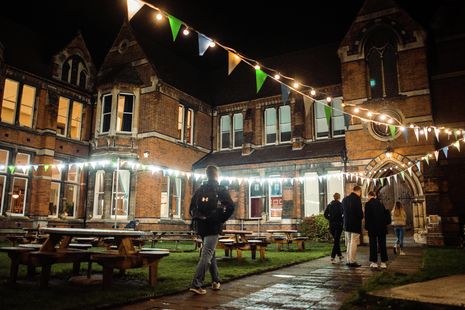No platform, no progress
Ben Lubitsh argues that deplatforming controversial figures such as Charlie Kirk would be a step backwards

Charlie Kirk’s widely anticipated appearance at the Cambridge Union’s chamber earlier this term met with mixed responses. Just as passionate as the excited bunch who craved to hear what the controversial figure had to say were the angry protesters who criticised the Union for platforming a man who they would argue promotes hatred and bigotry.
Truly, an all-too-common intellectual arrogance clouds the good-hearted political discourse at Cambridge, and I think the idea that Kirk is merely an enforcer of harmful and derogatory narratives that should not be platformed is a prime example of this.
“Giving someone a platform does not legitimise their views”
If it isn’t already clear, perhaps I should make it so: I am not a defender of Charlie Kirk, nor am I anything close to one. Yet I also don’t feel that my resentful attitude towards his views ought to disallow his appearance at a debating union which prides itself on promoting free speech and a range of perspectives.
And no, I don’t wish to turn this into a free speech debate, because it’s not. It’s a question of how we should deal with the views we disagree with (or even deeply resent) on the way to defeating them.
It seems to be the expectation of many that the Union set aside its key principles of free speech at times where pursuing them would lead to some greater evil of showcasing Kirk-esque views. But this common critique of the Union rests on a heavily distorted notion of how political debate works.
Giving someone a platform in no way equates to legitimising their views. The Cambridge Union is not a government agency, nor is it the BBC; it is a debating society. Its entire purpose is to provide a space where ideas — even bad ones — can be challenged and interrogated. To argue that someone with extreme or offensive views should not be allowed through its doors is to misunderstand what debate actually is: a confrontation, not an endorsement.
“Intellectual arrogance clouds Cambridge’s political discourse”
The other side of this coin is that platforming goes both ways; in sharing the debate on public spheres, the Union has actively helped many of the students who debated Kirk to gain their own platform. And this doesn’t just mean a few more Tik Tok followers, but a genuine showcasing of the voice of the student body.
There also seems to be a fact about this whole discussion that many seem to either leave out or be blatantly unaware of. These ‘extreme’ views that we are dealing with when we engage with someone like Kirk aren’t so other-worldly as we might make them out to be. Kirk’s comments at the Union often raised eyebrows and even generated laughter, but they wouldn’t be so shocking to a large number of people across the pond.
In case the highly educated left of Cambridge wasn’t aware, Charlie Kirk represents the winning side in the US at the moment. Painting him out to be some ‘against the grain’ lunatic, therefore, is simply mistaken – regardless of what the Cambridge-centric mind insists on. As a result, refusing to give him a platform is either a gross underestimation of his significance or a refusal to engage with it – a political failure on both fronts.
If this same highly-educated left wishes to maintain its moral high ground, it must show an ability to argue rather than mere silence. It must show it can persuade, not simply prohibit. Otherwise, it risks becoming the very caricature its opponents already believe it to be. And if you ask me, it was those who insisted on this fact that made the debate an ultimate success.
 News / Colleges charge different rents for the same Castle Street accommodation2 March 2026
News / Colleges charge different rents for the same Castle Street accommodation2 March 2026 News / News in Brief: waterworks, wine woes, and workplace wins 1 March 2026
News / News in Brief: waterworks, wine woes, and workplace wins 1 March 2026 News / Climate activists protest for ‘ethical careers policy’1 March 2026
News / Climate activists protest for ‘ethical careers policy’1 March 2026 News / Angela Merkel among Cambridge honorary degree nominees27 February 2026
News / Angela Merkel among Cambridge honorary degree nominees27 February 2026 News / Private school teacher who lied about Cambridge degree barred from teaching27 February 2026
News / Private school teacher who lied about Cambridge degree barred from teaching27 February 2026









